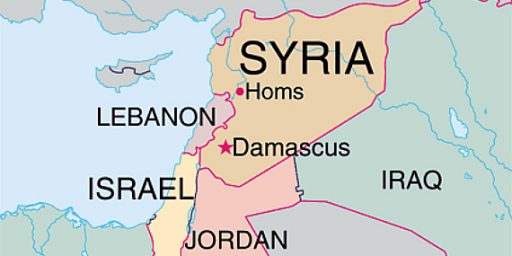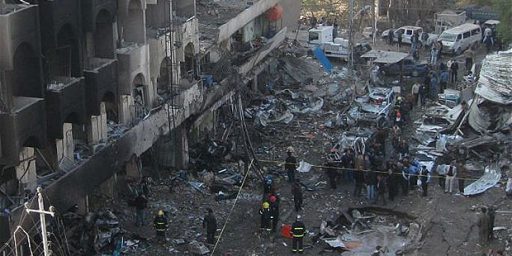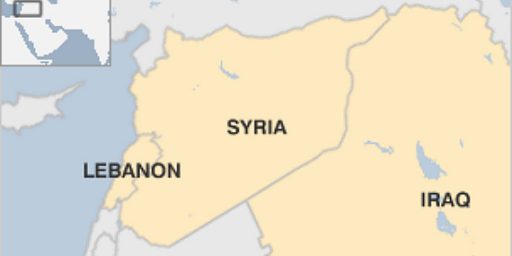Leading Saudi Sheik Issues Fatwa…
One of Saudi Arabia’s leading Wahhabi sheiks, Abdullah bin Jabreen has issued a strongly worded religious edict, or fatwa, declaring it unlawful to support, join or pray for Hezbollah, the Shiite militias lobbing missiles into northern Israel.
The day after Hezbollah abducted two Israeli soldiers on July 12, Sheik Hamid al-Ali issued an informal statement titled “The Sharia position on what is going on.” In it, the Kuwaiti based cleric condemned the imperial ambitions of Iran regarding Hezbollah’s cross border raid.
The surprising move demonstrates that Sunni Muslim fundamentalists in the Middle East are deeply divided over whether Moslems should support Hezbollah, Iran’s Shiite proxies in the war raging in Lebanon.
While the Gulf’s ascetic Wahhabi sects, who are closer to the ethnic fighting between Sunnis and Shiites in Iraq, have opposed Hezbollah in its stand against Israel’s forces, other Sunni fundamentalist groups, such as the Egyptian Muslim Brotherhood, have pledged their solidarity. On Friday, the brothers will host a rally in support of Hezbollah at Cairo’s most influential mosque, Al-Azhar.
The profound division between the most violent Muslim enemies of America and Israel may be one reason Arab capitals have not yet exploded in rage about Israel’s bombardment of Lebanon. The White House has already pointed to Jordanian, Egyptian, and Saudi government condemnation of Hezbollah.
The latest Arab Israeli war presents a conundrum for many Sunni Jihadists. On the one hand, a chance to join in the resistance against the Jewish state presents a rare opportunity for zealots who revere the Palestinian Arab martyrs that have sacrificed their lives to kill Jewish civilians. But the main group doing the fighting, and instigating the war this time in Lebanon, are supported by the same Shiite state that supplies and funds the militias killing Sunni civilians in Iraq.
“I think that fatwas like Jebreen’s are significant, because the division between Sunnis and Shia is more apparent than in the past,” the director of the SITE Institute, a group that tracks the online Jihad community, Rita Katz, said yesterday. Mr. Jebreen retired two years ago from Saudi Arabia’s government committee approving fatwas. Ms. Katz says he is considered one of the most respected and more mainstream Wahhabi clerics in Saudi Arabia.
I know that some will point out that, to some extent, this is a choice between the lesser of two evils, though, it also must be noted that Sheik Abdullah bin Jabreen could have remained silent on the matter altogether. So, since we all need a little optimism at the moment, let’s just call this progress, however minuscule.
UPDATE (James Joyner): Cori Dauber observes that it’s not all that surprising that the Saudis would oppose “a Shia group, supported by Iran, a Shia country” but still believes it significant that would speak out against them while they’re taking on the hated Jews. John Burgess notes that the Saudi royals have made many overtures to the Shia and contends that “simple geopolitics provides a better answer.” Interestingly, he argues that the conventional wisdom that we have terrorist tails wagging the state dogs in both Gaza and Lebanon precisely backward, dubbing it a PlayStation war.






Lets connect the dots. Hezbollah is supported by Iran.
Israel is far enough from Iran to make an attack difficult, but not impossible.
Saudi Arabia doesn’t like Iran for a variety of reasons.
Saudi Arabia has some first class airfields looking for a new tenant.
Imagine Saudi Arabia allowing Israel to overtly or covertly base or stage planes through its bases for attacks on Iran.
I don’t consider this minuscule progress. The Saudis are starting to differentiate the political from the religious here and that’s major.
It’s too simplistic to see Saudi condemnation of Hezbollah as a Sunni-Shi’a thing. Far more important to the Saudis is the power relationship it has with Iran, purely as a major political and military force.
Sectarian differences certainly do play some role, but most of the animosity can be related to the Arab/Fars split, the search for dominance in the region, and grave concerns over Iranian land-grabbing. That the Iranians could also do significant damage to oil shipping in the region is also of considerable consequence.
For a Saudi take emphasizing the secular nature of this rebuffing of Hezbollah, see my blog post at Crossroads Arabia.
Imagine Saudi Arabia allowing Israel to overtly or covertly base or stage planes through its bases for attacks on Iran.
And a pony.
I think the imagined course of action might actually bring the Saudi regime down. Which I used to think might be a good thing, but not so much any more.
Yeah, I saw that. But what is really interesting is that the elected government of American occupied Iraq has unanimously, from the Prime Minister on down, condemned Israel for the violence against Lebanon.
http://www.nytimes.com/2006/07/20/world/middleeast/20shiites.html
Ken, your link to the NY Times tells us who you are, but then those of us who read this blog regularly recognize agents from Kos.
YAJ,
I highly doubt it. The Saudis have already lost a lot of face & influence in the Muslim world for allowing the ‘Great Satan’ to base military assets in the same country that protects the biggest shrines of all Islam (Mecca & Medina). If word ever got out that they’d let Israelis fly warplanes from Saudi land, that entire part of the world would run red with blood.
That said, it is a good sign that someone, anyone, in the Moslem world is willing to condemn Hezbollah…
agents from Kos
One of my favorite novels from the Golden Age of SF, to be sure.
I see this as a positive mesage from Abdullah bin Jabreen, in that it runs counter to the “enemy of my enemy is my friend” mentality so prevalent in the middle east